Zanata¶

Translate the world¶
or: How to build your own infrastructure for multi-language documentation.
Imagine there are about 194 countries on the world, most of them with one or more then one language. And countless dialects, like Saxon. How you want to reach all your customer if your products or services are only described in ONE language?
Zanata is a web-based translation platform for translators, content creators and developers to manage localization projects. Zanata is Open Source. The Installation is divided in server and client.
Server¶
Zanata requires Java, Apache, Wildfly, MySQL, and an e-mail service. For easy installation we use Puppet, specially puppet-zanata All installation steps are done by root
Install deb packages:
apt-get update
apt install -y git puppet-common python-pip
pip install pip -U
Clone Git repositories:
git clone -b dev https://github.com/eumel8/puppet-zanata /etc/puppet/modules/zanata
git clone -b v1.2.4 https://github.com/biemond/biemond-wildfly /etc/puppet/modules/wildfly
git clone https://github.com/puppetlabs/puppetlabs-apache /etc/puppet/modules/apache
git clone -b 3.10.0 https://github.com/puppetlabs/puppetlabs-mysql /etc/puppet/modules/mysql
git clone https://github.com/puppetlabs/puppetlabs-stdlib /etc/puppet/modules/stdlib
git clone https://git.openstack.org/openstack-infra/puppet-jeepyb /etc/puppet/modules/jeepyb
git clone -b v0.5.1 https://github.com/voxpupuli/puppet-archive /etc/puppet/modules/archive
git clone https://git.openstack.org/openstack-infra/puppet-httpd /etc/puppet/modules/httpd
git clone https://git.openstack.org/openstack-infra/puppet-logrotate /etc/puppet/modules/logrotate
git clone https://git.openstack.org/openstack-infra/puppet-vcsrepo /etc/puppet/modules/vcsrepo
git clone -b 1.1.3 https://github.com/puppetlabs/puppetlabs-firewall /etc/puppet/modules/firewall
git clone -b 1.5.0 https://github.com/camptocamp/puppet-postfix.git /etc/puppet/modules/postfix
Create MySQL client file:
cat > /root/.my.cnf << EOF
[client]
user=root
host=localhost
password=12345678
EOF
Create Puppet manifest:
cat > /etc/puppet/manifest/site.pp << EOF
#!/usr/bin/puppet apply
class {'::mysql::server':
root_password => "12345678",
remove_default_accounts => true,
create_root_my_cnf => true,
}
mysql::db { 'zanata':
user => 'zanata',
password => '12345678',
host => 'localhost',
grant => ['all'],
require => [
Class['mysql::server'],
File['/root/.my.cnf'],
],
}
include postfix
class { '::zanata':
mysql_host => 'localhost',
zanata_db_username => 'zanata',
zanata_db_password => '12345678',
zanata_openid_provider_url => 'https://openstackid.openstack.org',
zanata_listeners => ['ajp'],
zanata_admin_users => 'admin',
zanata_default_from_address => 'noreply@example.com',
zanata_main_version => 4,
zanata_url => 'https://github.com/zanata/zanata-platform/releases/download/platform-4.3.3/zanata-4.3.3-wildfly.zip',
zanata_checksum => 'eaf8bd07401dade758b677007d2358f173193d17',
zanata_wildfly_version => '10.1.0',
zanata_wildfly_install_url => 'https://repo1.maven.org/maven2/org/wildfly/wildfly-dist/10.1.0.Final/wildfly-dist-10.1.0.Final.tar.gz',
}
class { '::zanata::apache':
vhost_name => $vhost_name,
require => Class['::zanata']
}
include logrotate
logrotate::file { 'console.log':
log => '/var/log/wildfly/console.log',
options => [
'daily',
'rotate 30',
'missingok',
'dateext',
'copytruncate',
'compress',
'delaycompress',
'notifempty',
'maxage 30',
],
require => Service['wildfly'],
}
include jeepyb
logrotate::file { 'register-zanata-projects.log':
log => '/var/log/register-zanata-projects.log',
options => [
'compress',
'missingok',
'rotate 30',
'daily',
'notifempty',
'copytruncate',
],
}
EOF
Execute the manifest:
/etc/puppet/manifest/site.pp
Check on the web browser if Zanata server is running. Depends on the filesystem , it’s required to configure JBoss:
cd /opt/wildfly/bin
./jboss-cli.sh
connect
/subsystem=messaging-activemq/server=default:write-attribute(name=journal-type, value=NIO)
exit
systemctl restart wildfly.service
With Puppet the configured admin user is admin. That means, if you start the register process, go through the OpenID login process, you should use the username admin to get admin privileges for your account. After login generate your API key in User Settings->Client in your profile. The API key is for authorization on the server:
cat > ~/.config/zanata.ini << EOF
[servers]
zanata.lxd.url=https://zanata.lxd/
zanata.lxd.username=admin
zanata.lxd.key=cc8492e637f9f2c161d89bb3fb776783
EOF
Now you may setup a new project in Zanata and add languages to the project. Of course, you should join a language team. Here are some screenshots from what do you can expect:
New project:
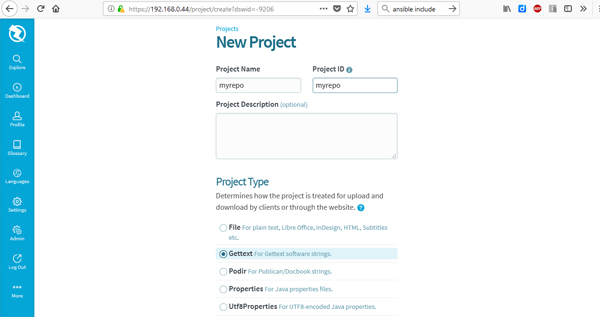
New version:
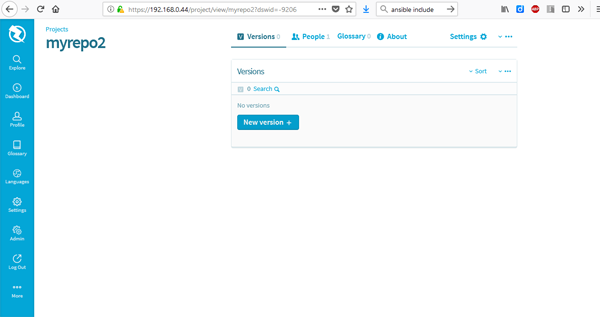
Configure gettext:
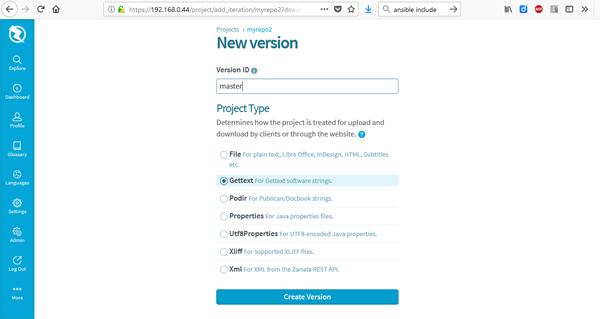
Configure languages:
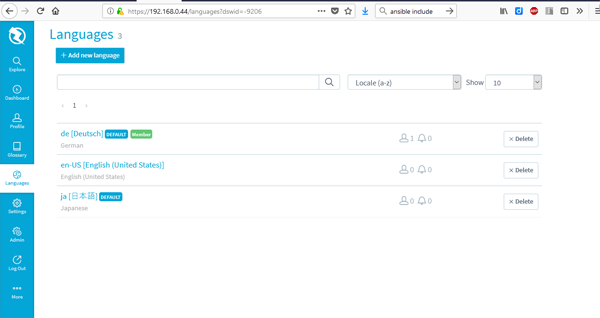
Add languages to project:
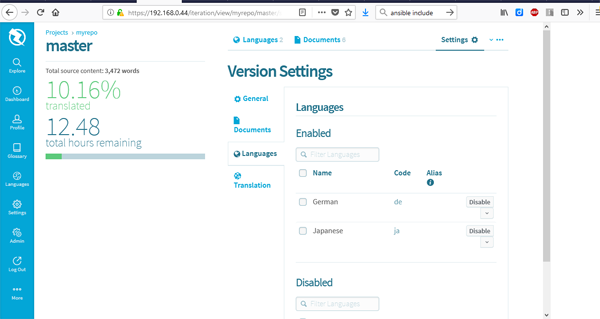
- More information for Zanata usage are available on
Client¶
Thank goodness Zanata client installation is much easier:
cd /opt
curl -s http://repo2.maven.org/maven2/org/zanata/zanata-cli/4.3.3/zanata-cli-4.3.3-dist.tar.gz | tar xz
ln -s /opt/zanata-cli-4.3.3/bin/zanata-cli /usr/local/bin
That’s it :-)